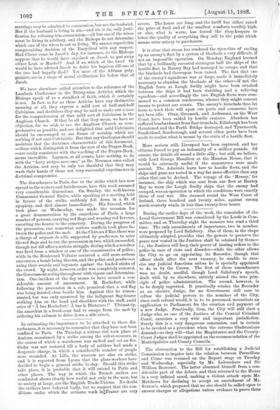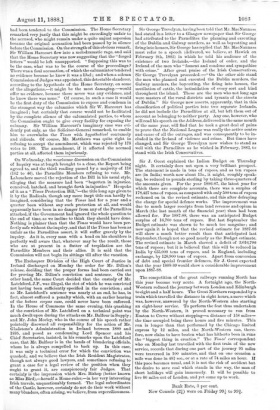The obstruction to the Bill for establishing a Judicial Commission
to inquire into the relation between Parnellism and Crime was resumed on the Report stage on Tuesday and Wednesday, especially by Mr. Labouchere and Sir William Harcourt. The latter absented himself from a con- siderable part of the debate, and then returned to the House in a very inflated mood, making a violent attack upon Mr. Matthews for declining to accept an amendment of Mr. Sexton's, which proposed that no one should be called upon to answer charges or allegations unless evidence to prove them had been tendered to the Commission. The Home Secretary remarked very justly that this might be exceedingly nnfair to the accused, who might remain under a quite unjust aspersion because the original accusation had been passed by in silence before the Commission. On the strength of this obvious remark, Sir William Harcourt flew into a melodramatic rage, and said that the Home Secretary was now suggesting that the "forged letters " would be left unsupported. " Supposing this was to be the case, what was to be the course of the proceedings P There was a foul accusation, of which the calumniator tendered no evidence because he knew it was a libel ; and when a solemn Commission of Judges was appointed, this detestable slanderer, according to the hypothesis of the Home Secretary, on some of the allegations,—it might be the most damaging.—would offer no evidence, because there never was any evidence, and he knew there was none." Of course, in such a case it world be the first duty of the Commission to expose and condemn in the strongest way the calumnies which Sir W. Harcourt has imagined ; but certainly that course would not be facilitated by the complete silence of the calumniated parties, to whom the Commission ought to give every facility for exposing the calumny. Sir William Harcourt's imaginary case was evi- dently put only, as the Solicitor-General remarked, to enable him to overwhelm the Times with hypothetical contumely and ridicule. Of course, Mr. Matthews was quite right in refusing to accept the amendment, which was rejected by 178 votes to 109. The amendment, if it affected the accused parties at all, affected them injuriously.



































 Previous page
Previous page